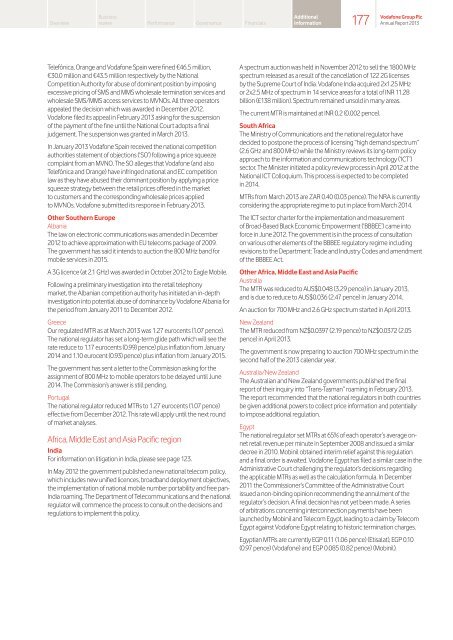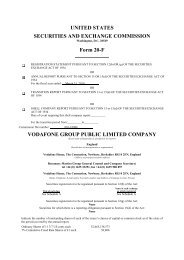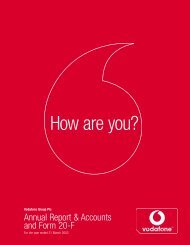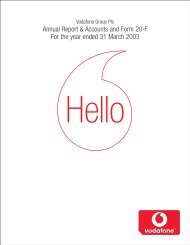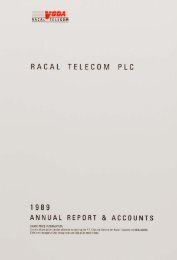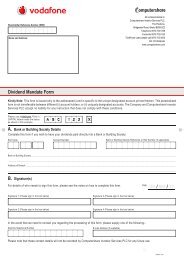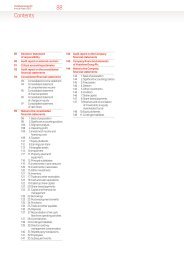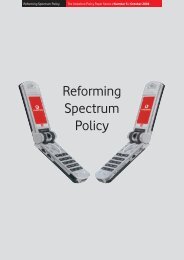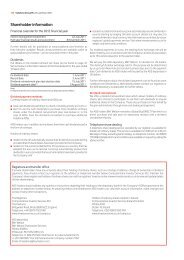The way ahead? - Vodafone
The way ahead? - Vodafone
The way ahead? - Vodafone
You also want an ePaper? Increase the reach of your titles
YUMPU automatically turns print PDFs into web optimized ePapers that Google loves.
Overview<br />
Business<br />
review Performance Governance Financials<br />
Telefónica, Orange and <strong>Vodafone</strong> Spain were fined €46.5 million,<br />
€30.0 million and €43.5 million respectively by the National<br />
Competition Authority for abuse of dominant position by imposing<br />
excessive pricing of SMS and MMS wholesale termination services and<br />
wholesale SMS/MMS access services to MVNOs. All three operators<br />
appealed the decision which was awarded in December 2012.<br />
<strong>Vodafone</strong> filed its appeal in February 2013 asking for the suspension<br />
of the payment of the fine until the National Court adopts a final<br />
judgement. <strong>The</strong> suspension was granted in March 2013.<br />
In January 2013 <strong>Vodafone</strong> Spain received the national competition<br />
authorities statement of objections (‘SO’) following a price squeeze<br />
complaint from an MVNO. <strong>The</strong> SO alleges that <strong>Vodafone</strong> (and also<br />
Telefónica and Orange) have infringed national and EC competition<br />
law as they have abused their dominant position by applying a price<br />
squeeze strategy between the retail prices offered in the market<br />
to customers and the corresponding wholesale prices applied<br />
to MVNOs. <strong>Vodafone</strong> submitted its response in February 2013.<br />
Other Southern Europe<br />
Albania<br />
<strong>The</strong> law on electronic communications was amended in December<br />
2012 to achieve approximation with EU telecoms package of 2009.<br />
<strong>The</strong> government has said it intends to auction the 800 MHz band for<br />
mobile services in 2015.<br />
A 3G licence (at 2.1 GHz) was awarded in October 2012 to Eagle Mobile.<br />
Following a preliminary investigation into the retail telephony<br />
market, the Albanian competition authority has initiated an in-depth<br />
investigation into potential abuse of dominance by <strong>Vodafone</strong> Albania for<br />
the period from January 2011 to December 2012.<br />
Greece<br />
Our regulated MTR as at March 2013 was 1.27 eurocents (1.07 pence).<br />
<strong>The</strong> national regulator has set a long-term glide path which will see the<br />
rate reduce to 1.17 eurocents (0.99) pence) plus inflation from January<br />
2014 and 1.10 eurocent (0.93) pence) plus inflation from January 2015.<br />
<strong>The</strong> government has sent a letter to the Commission asking for the<br />
assignment of 800 MHz to mobile operators to be delayed until June<br />
2014. <strong>The</strong> Commission’s answer is still pending.<br />
Portugal<br />
<strong>The</strong> national regulator reduced MTRs to 1.27 eurocents (1.07 pence)<br />
effective from December 2012. This rate will apply until the next round<br />
of market analyses.<br />
Africa, Middle East and Asia Pacific region<br />
India<br />
For information on litigation in India, please see page 123.<br />
In May 2012 the government published a new national telecom policy,<br />
which includes new unified licences, broadband deployment objectives,<br />
the implementation of national mobile number portability and free pan-<br />
India roaming. <strong>The</strong> Department of Telecommunications and the national<br />
regulator will commence the process to consult on the decisions and<br />
regulations to implement this policy.<br />
Additional<br />
information<br />
177<br />
<strong>Vodafone</strong> Group Plc<br />
Annual Report 2013<br />
A spectrum auction was held in November 2012 to sell the 1800 MHz<br />
spectrum released as a result of the cancellation of 122 2G licenses<br />
by the Supreme Court of India. <strong>Vodafone</strong> India acquired 2x1.25 MHz<br />
or 2x2.5 MHz of spectrum in 14 service areas for a total of INR 11.28<br />
billion (£138 million). Spectrum remained unsold in many areas.<br />
<strong>The</strong> current MTR is maintained at INR 0.2 (0.002 pence).<br />
South Africa<br />
<strong>The</strong> Ministry of Communications and the national regulator have<br />
decided to postpone the process of licensing “high demand spectrum”<br />
(2.6 GHz and 800 MHz) while the Ministry reviews its long-term policy<br />
approach to the information and communications technology (‘ICT’)<br />
sector. <strong>The</strong> Minister initiated a policy review process in April 2012 at the<br />
National ICT Colloquium. This process is expected to be completed<br />
in 2014.<br />
MTRs from March 2013 are ZAR 0.40 (0.03 pence). <strong>The</strong> NRA is currently<br />
considering the appropriate regime to put in place from March 2014.<br />
<strong>The</strong> ICT sector charter for the implementation and measurement<br />
of Broad-Based Black Economic Empowerment (‘BBBEE’) came into<br />
force in June 2012. <strong>The</strong> government is in the process of consultation<br />
on various other elements of the BBBEE regulatory regime including<br />
revisions to the Department: Trade and Industry Codes and amendment<br />
of the BBBEE Act.<br />
Other Africa, Middle East and Asia Pacific<br />
Australia<br />
<strong>The</strong> MTR was reduced to AUS$0.048 (3.29 pence) in January 2013,<br />
and is due to reduce to AUS$0.036 (2.47 pence) in January 2014.<br />
An auction for 700 MHz and 2.6 GHz spectrum started in April 2013.<br />
New Zealand<br />
<strong>The</strong> MTR reduced from NZ$0.0397 (2.19 pence) to NZ$0.0372 (2.05<br />
pence) in April 2013.<br />
<strong>The</strong> government is now preparing to auction 700 MHz spectrum in the<br />
second half of the 2013 calendar year.<br />
Australia/New Zealand<br />
<strong>The</strong> Australian and New Zealand governments published the final<br />
report of their inquiry into “Trans-Tasman” roaming in February 2013.<br />
<strong>The</strong> report recommended that the national regulators in both countries<br />
be given additional powers to collect price information and potentially<br />
to impose additional regulation.<br />
Egypt<br />
<strong>The</strong> national regulator set MTRs at 65% of each operator’s average onnet<br />
retail revenue per minute in September 2008 and issued a similar<br />
decree in 2010. Mobinil obtained interim relief against this regulation<br />
and a final order is awaited. <strong>Vodafone</strong> Egypt has filed a similar case in the<br />
Administrative Court challenging the regulator’s decisions regarding<br />
the applicable MTRs as well as the calculation formula. In December<br />
2011 the Commissioner’s Committee of the Administrative Court<br />
issued a non-binding opinion recommending the annulment of the<br />
regulator’s decision. A final decision has not yet been made. A series<br />
of arbitrations concerning interconnection payments have been<br />
launched by Mobinil and Telecom Egypt, leading to a claim by Telecom<br />
Egypt against <strong>Vodafone</strong> Egypt relating to historic termination charges.<br />
Egyptian MTRs are currently EGP 0.11 (1.06 pence) (Etisalat), EGP 0.10<br />
(0.97 pence) (<strong>Vodafone</strong>) and EGP 0.085 (0.82 pence) (Mobinil).


